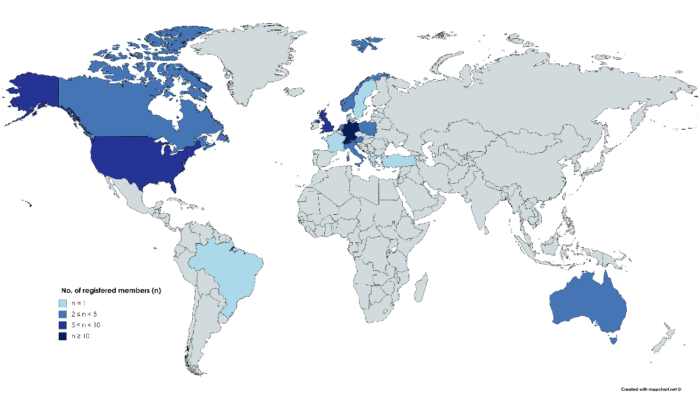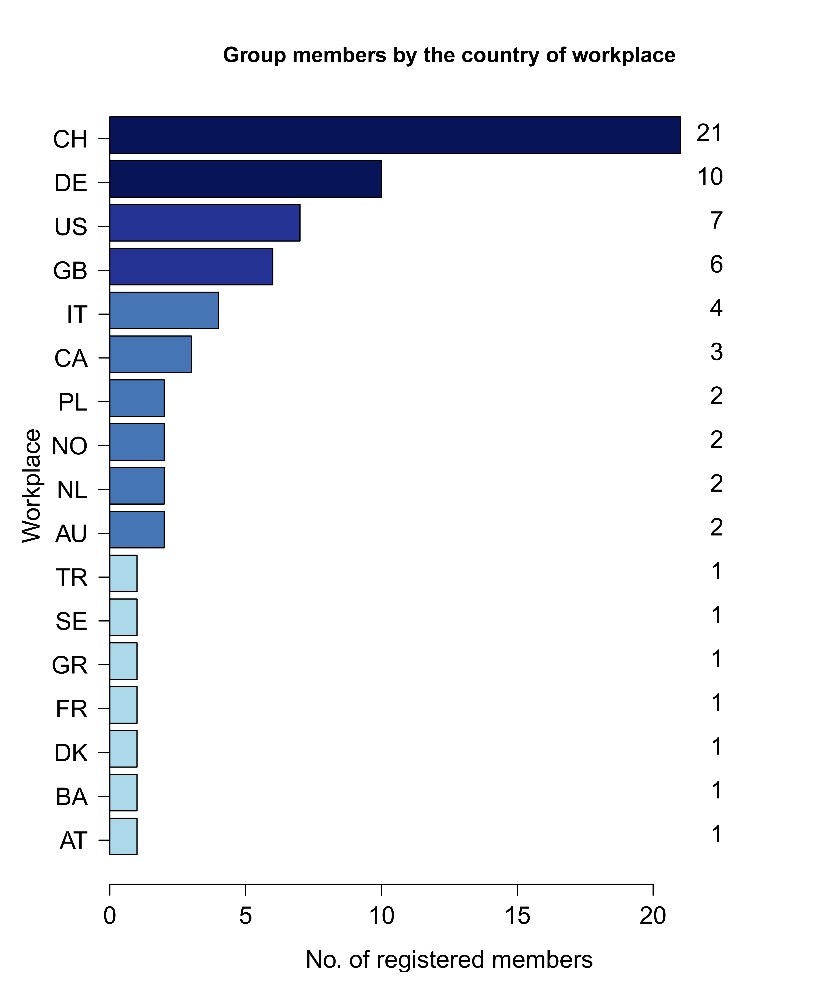
Geographical location of the WomenInHydrology members by their workplace, stand: 31.03.2020
What is WomenInHydrology about?
WomenInHydrology is a Google Group mailing list created to encourage and foster the active participation of female hydrologists in the hydrological community. While the information content is not intended to be only women-oriented, the mailing list is dedicated specifically to females in hydrology. However, anyone (regardless of their gender) interested in joining the group is welcome to contact us to get access. WomenInHydrology is thereby open to any (female) hydrologist worldwide, be it a scientist or a practitioner. We believe that having a mixture of scientists and practitioners at different career stages makes the benefits of this platform only stronger.
Why is WomenInHydrology needed?
Gender diversity is seen as an important factor for creating a healthy work environment in research groups and at workplaces in general (Popp et al., 2019). Yet, plenty of evidence exists for gender biases in geoscience fields leading to a disproportional decline of female scientists as they advance in their career (e.g., Alper, 1993; Grogan 2018). This phenomenon, first described by Alper in 1993, is nowadays known as the leaky pipeline. Several actions have already been undertaken to “fix” the leaky pipeline, such as creating mentoring programs, providing facilities for child day-care, or supporting careers with female-specific grants (Gvozdanović and Maes 2018). By initiating WomenInHydrology we want to further extend the list of means by providing an online platform for an active scientific exchange between female hydrologists.
What is WomenInHydrology aiming at?
Biographies of senior academic female scientists (Powell 2018) have shown that a supportive scientific network with mentors as well as discussions within female allies are key to build confidence in our (female) work and to encourage women to actively participate in the scientific community. Particularly, a lack of suitable networks for the exchange between female scientists is seen as an important factor affecting the gender bias in currently men-dominated networks (Popp et al. 2018). WomenInHydrology is our way to enable such a network for a large number of female hydrologists at a global scale. It provides the opportunity to advertise jobs and workshops, to find collaborators, fellows or mentors, or to find support in specific hydrologic or career related issues.

Summary of the WomenInHydrology members by their workplace, stand: 31.03.2020
How was WomenInHydrology born?
The idea of the mailing list was born in early 2020 during a coffee break at the University of Zurich when discussing the fact that much less women than men subscribe to scientific workshops. A quick google search confirmed us that a mailing list, which could be used to specifically reach out to many female hydrologists, had still been missing in the hydrologic community. The WomenInHydrology Google Group was then created on 31st of January 2020 and since then we have had 66 subscriptions (stand: 01.04.2020) from different parts of the globe. Currently, most of the WomenInHydrology group members work in Switzerland (which is our workplace), Germany, Great Britain or the USA. With this post we therefore hope to extend our network and to also reach female hydrologists from other less well represented countries.
How does WomenInHydrology work?
The WomenInHydrology mailing list is similarly organised as the AboutHydrology* list, that is, everyone signed up is welcome to be active and share information with other group members. To ensure that we do not duplicate the content of other mailing lists and to limit the number of posts to a reasonable amount, we moderate all posts before posting them online. We are therefore happy to receive your post or any feedback via email!
How to subscribe to WomenInHydrology?
If you wish to subscribe to the mailing list or if you need more information, please visit this website.
References
- Alper, J. (1993). The pipeline is leaking women all the way along. Science, 260(5106), 409-411. https://doi.org/10.1126/science.260.5106
- Conley, D., and Stadmark, J. (2012). A call to commission more women writers. Nature, 488(7413), 590. https://doi.org/10.1038/488590a
- Grogan, K.E. (2019) How the entire scientific community can confront gender bias in the workplace. Nat Ecol Evol 3, 3-6. https://doi.org/10.1038/s41559-018-0747-4
- Gvozdanović, J., and Maes, K. (2018) Implicit bias in academia: A challenge to the meritocratic principle and to women’s careers – And what to do about it. The League of European Research Universities (LERU) Paper.
- Popp, A. L., Lutz, S. R., Khatami, S., van Emmerik, T., and Knoben, W. J. M. (2019) A global survey on the perceptions and impacts of gender inequality in the Earth and space sciences. Earth and Space Science, 6, 1460–1468. https://doi.org/10.1029/2019EA000706
- Powell K. (2018) She persisted. Six women talk to Nature about navigating gender bias in academia. Nature, Career feature, 561, 421-423, doi: 10.1038/d41586-018-06697-3
* AboutHydrology is a Google Mailing dedicated to hydrology related issues and is open for all hydrologists.
About the initiators of WomenInHydrology
G uest authors are Anna E. Sikorska-Senoner (right) and Sandra Pool (left). They are the initiators of WomenInHydrology. Anna E. Sikorska-Senoner (University of Zurich, Switzerland) and Sandra Pool (Swiss Federal Institute of Aquatic Science and Technology, Eawag, Switzerland), both Postdocs and friends, shared their office during four years of their Postdoc and PhD at the University of Zurich. Since then, sharing their passion for hydrology and discussing many personal questions have always been helpful and, of course, lots of fun!
uest authors are Anna E. Sikorska-Senoner (right) and Sandra Pool (left). They are the initiators of WomenInHydrology. Anna E. Sikorska-Senoner (University of Zurich, Switzerland) and Sandra Pool (Swiss Federal Institute of Aquatic Science and Technology, Eawag, Switzerland), both Postdocs and friends, shared their office during four years of their Postdoc and PhD at the University of Zurich. Since then, sharing their passion for hydrology and discussing many personal questions have always been helpful and, of course, lots of fun!
Edited by Maria-Helena Ramos

Pingback: WomenInHydrology initiative – Anna E. Sikorska-Senoner
Pingback: WomenInHydrology initiative – Anna Senoner